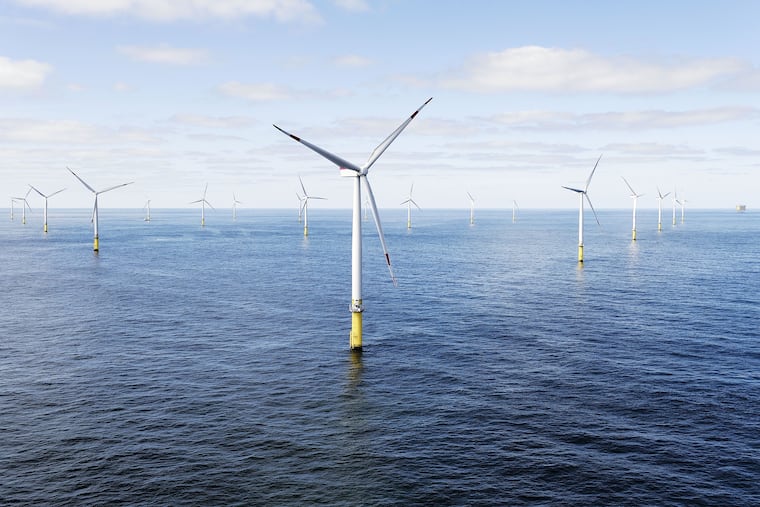It’s not about the whales: Opposition to N.J. wind farms is selfish and shortsighted | Editorial
Opponents have used several red herrings to try to thwart the project, including the whale deaths and claims of negative impacts on tourism, the fishing industry, and property values.

As Earth burns this summer, with climate change leading to increasingly intense weather, plans for a wind farm along the Jersey Shore remain bogged down in a legal tangle that threatens to slow or derail an important source of clean energy.
It’s a shortsighted blunder as the need to reduce greenhouse gas emissions grows more obvious by the day, with record wildfires, flash floods, and extreme heat waves causing needless death and destruction across the region, the nation, and the world.
The Department of the Interior’s Bureau of Ocean Energy Management approved a plan earlier this month to construct up to 98 wind turbine generators off the coast of Atlantic City and Ocean City. The Ocean Wind 1 project is expected to produce enough clean energy to power about 400,000 homes and produce more than 3,000 good-paying jobs.
Similar wind farms are planned or under construction off the coasts of California, Martha’s Vineyard in Massachusetts, and Rhode Island and New York. Meanwhile, wind and solar power have enabled Texas to meet increased energy demand.
» READ MORE: Looking for shelter from extreme weather? Try a voting booth | Editorial
The wind farms off the coast of New Jersey are an integral part of the Biden administration’s ambitious goal to eliminate fossil fuels as a form of energy generation in the U.S. by 2035. Currently, around 60% of U.S. energy production comes from burning fossil fuels, such as coal, oil and gas, which are a leading cause of greenhouse gas emissions.
Scientists warn we are running out of time to reverse the effects of man-made climate change and speed up efforts to convert to clean energy such as wind and solar power.
But three residents groups filed a lawsuit to block the wind farm in New Jersey, while Republican state lawmakers want to halt construction until more studies can be done to see if the wind farms are related to the recent deaths of several whales. Local governments along the Jersey Shore have been slow to issue permits, forcing Orsted, the Danish company behind the wind farm, to also turn to the courts for relief.
Much of the foot dragging stems from NIMBYism and misinformation. Opponents of the wind turbines have used several red herrings to try to thwart the project, including the whale deaths and claims of negative impacts on tourism, the fishing industry and property values.
Federal agencies and experts have found no link between wind farms and whale deaths, but that has not stopped the spread of lies by some GOP lawmakers, the fossil fuel industry, and Fox News. Experts say ship strikes, changing ocean temperatures, and possibly a virus are to blame for the whale deaths.
Some argue the wind farms will reduce property values, but studies found that is largely not the case. Others fear the wind farms will hurt tourism and the local fishing industry. That has not been the experience on Block Island, an upscale resort off Rhode Island that is home to five wind turbines just 3.8 miles from shore. The Block Island wind farm has actually attracted tourists, lowered electric bills, and boosted fishing quality thanks to the artificial reefs that form at the base of the turbines that attract mussels, barnacles, and other species, studies found.
» READ MORE: There’s a bleak message written in Philly’s haze: climate change is at our doorstep | Editorial
In New Jersey, the main objection from oceanfront homeowners and beachgoers is that the 850-foot-high turbines will ruin their view. To be sure, the turbines — located about 15 miles from Atlantic City — will be faintly visible along the beaches from Brigantine to Stone Harbor.
However, the distant view of wind turbines producing clean energy is at best a minor annoyance, especially when compared to sea level rise caused by a warming world. The view does not improve if your home is underwater.
The recent power outage in Wildwood also underscores the need for alternative energy sources. In the long run, more clean energy will protect whales and other marine life by preventing ocean temperatures from further warming and preserving their habitat.
Not to mention, wind farms are a drastic improvement from former President Donald Trump’s failed plan to allow oil drilling off the coast of New Jersey. In place of selfish delay tactics or Trump’s reckless call to “drill, baby, drill,” for the sake of the planet, a new mantra should be for more wind turbines to “turn, baby, turn.”